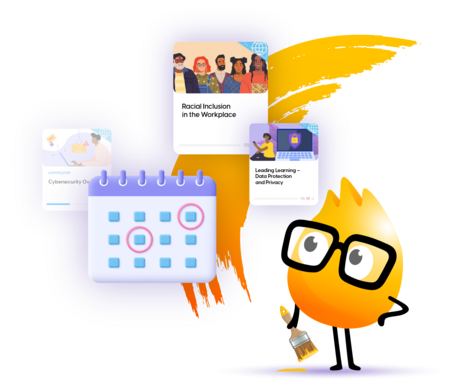Train to Win: 5 Tips for Building Better Sales Onboarding
You’ve hired a new member of your sales team. You’ve sifted through applications, gone through the interview process, and found the person who fits your requirements, your culture, and your organization’s revenue needs. You have high expectations for them. Maybe they’re replacing a top performer on your team. Perhaps you’ve been operating lean during the hiring process.
In this scenario, of course you’re eager for your new sales rep to get started. Immediately, if possible.
Not so fast! New salespeople need more time than you’d think to ramp up. Research shows it takes an average of three months for a new rep to be ready to interact with buyers, nine months for them to be competent to perform, and 15 months to become a top sales performer.
But that’s a long time. And you need to close deals now. So, what can you do?
Could Onboarding Improve Business Performance?
Onboarding: it’s HR paperwork, and teaching reps how the CRM works, and basic product training, right? Not exactly. A strong employee onboarding program does more than simply teach new hires the ropes. Research shows that organizations with a standard onboarding process increase new hires’ productivity by 54%, and can improve win rates by 14%. In fact, one study shows that onboarding can cut ramp time by 50%.
Strong onboarding also ultimately leads to greater sales success: 69% of salespeople are more likely to stay with an organization for at least three years after a great onboarding experience. This is huge, considering that the average turnover rate for salespeople is currently hovering around 35% and that it costs more than $200,000 to replace a high performing sales rep.
Despite these numbers, not all organizations invest in sales onboarding, and some don’t onboard at all. Do a Google search for sales onboarding, and you’ll see more than one online forum in which sales reps say their onboarding was extremely basic, or that they received no onboarding at all.
This is likely because sales organizations don’t understand just how important onboarding is.
5 Tips for Building a Strong Sales Onboarding Program
How can you build a strong onboarding program that will reduce ramp time, support reps, and boost the bottom line? Below are some tips for creating the best possible onboarding program for your new hires.
- Don’t Rush the Onboarding Process
Data shows that 18% of B2B sales organizations put their reps in front of buyers on their very first day. But new hires with longer onboarding programs are actually better at their jobs 4 months sooner than reps in companies with shorter onboarding programs. So, as eager as you might be for new hires to start making sales, conducting a longer onboarding process is the better bet for your bottom line. - Use Every Opportunity to Reinforce Learning
New sales reps have a lot to learn about your products, sales process, strategy, and customers. You can’t just give them content once and hope it sticks. Reps need to apply what they’ve learned, and they need to be exposed to the information more than once. In fact, according to research, 87% of sales training is forgotten within one month. Provide refreshers regularly to reinforce what your reps have learned. Micro and nano learning — providing small chunks of content on just one subject — can help with this. So can having a searchable library of sales training content so that reps can revisit topics on their own. - Take Learning Online
While instructor-led training in a classroom is a perennial favorite among learners, online learning that can be revisited is very important, especially when new hires need a refresher on complicated or dry information. In fact, that for technical and compliance information, most learners are reported to favor online learning.Develop a program that speaks to your team’s specific learning needs. Creating a program that uses a mix of learning modalities is critical for effective sales training programs because it allows you to optimize for the type of content and the preferences or needs of your sales reps. For instance, certain topics are easier for learners to digest at their own pace, while others might be better coming from an instructor. - Add Sales Strategy Training
Of course, you want your new hires to know your product inside and out. However, your onboarding should not be limited to product information. Salespeople also need to know how to sell, and how to tie the information they’re learning to their sales goals.Research from ATD shows that the best sales organizations spend less time on product training and more on teaching sales strategy. Strategy training keeps salespeople up to date on sales processes, methodologies, and systems. It also helps them to be more strategic thinkers and problem-solvers, which is what you want as they overcome objections and identify new sales opportunities. - Train Remote Sellers, Too
The pandemic changed sales dramatically, with remote work becoming the norm. While sales reps like working from home, research shows that those sellers aren’t always getting the same training as their in-office peers. Only 32% of companies with remote salespeople offer a fully-structured training program for remote employees.This is a missed opportunity because remote sellers are likely to need more support, especially if they are selling virtually. According to one survey, 58% of reps say it’s harder to sell virtually than in an office, while 40% say they’re not trained to sell remotely. However, companies that do offer structured training programs for remote sales teams are much more likely to be high performers than those that do not.
Making Sales Onboarding a Priority
You’ve put a lot of energy into hiring your new sales reps. The last thing you want to do is throw them into their new roles unprepared. If you do that, you’re risking a lot: they might quit, they might upset a valued customer, or they could lose a deal you should have won.
Building a comprehensive onboarding program not only sets your new sales reps up for success, but also strengthens your sales team’s foundation for long-term growth and success.
Are you interested in enhancing not just onboarding, but your organization’s entire sales training cycle? Make sure to check out our latest eBook, Rev Up Revenue: Sales Training for Every Career Stage to gain expert insights on building effective sales training program for every stage of a salesperson’s career.





